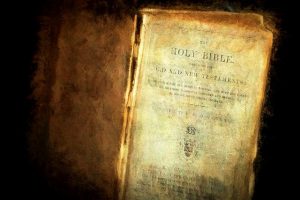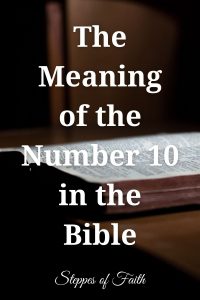
“Teach us to number our days, that we may gain a heart of wisdom.” Psalm 90:12
Any time we see a number in the Bible, it is meant to convey a specific meaning. For example, the number 6 is the number of man, the number 3 means divine perfection and permanence, and the numbers 7 and 12 mean completion and spiritual perfection, i.e., holiness. The number 10, mentioned 242 times in the Bible, also has a special meaning—authority, completeness of order, and responsibility.
In its original meaning, some believe 10 indicates “union” or “collection.” In Judaism, the rabbis regard the number 10 as a cohesive system of smaller parts that combine to create something whole. This belief is why rabbis regard 10 as meaning holiness, something holy enough as a whole that whatever God creates becomes a resting place for His presence (Shekinah Glory).
With this thought in mind, we find two factors of the number 10 are 4 and 6. Four is the number of physical creation, and 6 is the number of man, as mentioned. Put together, 10 indicates God’s authority over mankind and the divine completion He made. We see evidence of this in Genesis 1, which recounts the creation story and the phrase “God said” 10 times. One example is Genesis 1:26.
[READ MORE: What the Number 6 Means in the Bible and Why You Should Care]
“Then God said, ‘Let Us make man in Our image, according to Our likeness.” Genesis 1:26
Also, in Genesis 1, God created 10 things on the first day of creation and 10 things on the sixth and final day of creation, and He declared it all “good.”
God’s divine authority over creation and the holiness He placed on it is clearly indicated in this portion of Scripture. Remember, too, the Garden of Eden, a holy place God created as a place for Adam to interact with Him physically—a place of “union.”
Tithing 10%
The Hebrew word for the number 10 is eser. As written, it is very close to the word osher, which means “wealth.” The connection is why some people believe 10 is the number for tithing in such Scriptures as these:
“And concerning the tithe of the herd or the flock, of whatever passes under the rod, the tenth one shall be holy to the LORD.” Leviticus 27:32
“You shall truly tithe all the increase of your grain that the field produces year by year. And you shall eat before the LORD your God in the place where He chooses to make His name abide, the tithe of your grain and your new wine and your oil, of the firstborn of your herds and your flocks, that you may learn to fear the LORD your God always.” Deuteronomy 14:22-23
“Honor the LORD with your possessions, and with the firstfruits of all your increase.” Proverbs 3:9
Under the old covenant God made with Moses, every person must tithe 10 percent, the first part of one’s income. Because of the new covenant of grace established by Jesus by His crucifixion and resurrection, some scholars debate if God still holds believers to the 10 percent rule. The New Testament does not clearly indicate it. However, 2 Corinthians 9 instructs us on the importance of giving to others, that in our giving, God will bless us with a replenishment.
“And God is able to make all grace abound toward you, that you, always having all sufficiency in all things, may have an abundance for every good work. Now may he who supplies seed to the sower and bread for food, supply and multiply the seed you have sown and increase the fruits of your righteousness. For the administration of this service not only supplies the needs of the saints but also is abounding through many thanksgivings to God.” 2 Corinthians 9:8,10,12
The New Testament does not explicitly state we are to give 10 percent. Regardless, we know God will bless those who give generously and cheerfully (2 Corinthians 9:7) to those in need, whether we are giving to an individual or a church.
“’Bring all the tithes into the storehouse that there may be food in My house. And try Me now in this,’ says the LORD of hosts, ‘If I will not open for you the windows of heaven and pour out for you such blessing that there will not be room enough to receive it.’” Malachi 3:10

10 Commandments, Plagues, and Redemption
One of the most famous examples of the number 10 in the Bible is the 10 Commandments in Exodus 20. Moses received these commandments directly from the Lord on Mount Sinai.
Theoretically, the first four are directed toward God (vertical in nature). The other six have to do with human relations (horizontal). Putting the vertical with the horizontal, one might observe a picture of the cross. And, if one observed all 10 commandments, one would live in peace with both God and man. Unfortunately, sin gets in the way. But, again, we see God’s holy design and His authority over mankind.
Another instance of the number 10 is when God caused the 10 plagues on the Egyptians in Exodus 7-11. God caused Pharaoh’s heart to harden after he refused to grant the Hebrews’ freedom from slavery. It was not until after the tenth plague (killing of the firstborn son) that Pharaoh finally allowed the Hebrews to leave. The 10 plagues represent God’s judgment on Egypt for its pagan practices and His ultimate authority over the affairs of men.
We also see an example of the number 10 in how God wants His people to respond to His authority.
In Ruth 4, Boaz redeems Ruth and takes her as his wife. Boaz first speaks to Naomi’s closest living relative and offers him the chance to buy Naomi’s dead husband’s land. The relative agrees until Boaz informs him he also had to take Ruth as his wife. Not wanting to ruin his inheritance, the relative refuses to buy the land (v6) and tells Boaz to do it, which he gladly does (v8-10) and unwittingly continues the scarlet thread.
[READ MORE: What is the Scarlet Thread in the Bible?]
To finalize the deal, Boaz calls together ten elders of the village to witness the transaction. Because of the “union” of ten elders, we see in this story how man is meant to obey God’s law and behave responsibly toward it.
Sprinkles of 10
Numerous other examples of the number 10 are sprinkled throughout the Bible to illustrate God’s authority and divine perfection. In the Old Testament,
- Families chose a Passover lamb on the tenth day of the first month of the Jewish calendar (Exodus 12:3)
- Ten days of repentance are required between Rosh Hashanah or Feast of Trumpets, which occurs on the first day of the seventh month of the Jewish calendar (Tishri 1). The 10 days of repentance conclude on the Day of Atonement (Yom Kippur, Tishri 10). During this time, families traveled to the temple in Jerusalem to seek God’s forgiveness of sin for the upcoming year. Though the Romans destroyed the temple in 70 A.D., Jews still celebrate these High Holy days and annually seek God’s forgiveness (Leviticus 23:23-32).
- Ten generations passed between Adam and Noah (Genesis 6:5-8) when God destroyed all mankind except Noah and his family. Another 10 generations passed between Noah and Abraham (Genesis 11:10-26) when God promised Abraham He would make him the father of many nations (Genesis 17:4).
- King Nebuchadnezzar found Daniel, Shadrach, Meshach, and Abednego 10 times better than all the magicians and astrologers in the kingdom (Daniel 1:20).
- King Nebuchadnezzar had a dream about a beast with 10 toes, which Daniel interpreted through God to refer to the 10 kings in power in a revived Roman Empire at the time of Jesus’ second coming (Daniel 2:41-42).
In the New Testament,
- Jesus healed ten men of leprosy and sent them to the priests to be declared clean (Luke 17:11-19).
- Jesus made 10 “I AM” statements in the book of John.
- Jesus used the number 10 in several of His parables: 10 virgins (Matthew 25:1-13, 10 talents (Matthew 25:14-30), and 10 minas (Luke 19:12-27).
- The 10 toes in Daniel 2 are the same as the 10 horns in Daniel 7:24 and Revelation 13 and 17. All refer to the Gentile empires from which the antichrist will arise (13:1; 17:12). Here, the number 10 indicates complete military and political power.
In each Scripture, 10 indicates God’s authority, completeness, order, and divine perfection.

The Lost Books
The Old Testament mentions 10 books that did not make it into the final version of the Bible we read today. Some refer to these books as the “lost books.”
- The Book of the Wars of the Lord (Numbers 21:14)
- The Book of Jasher (Joshua 10:13; 2Samuel 1:18)
- The Book of the Acts of Solomon (1Kings 11:41)
- The Book of Nathan the Prophet (1Chronicles 29:29)
- The Book of Gad the Seer (1Chronicles 29:29)
- The Prophecy of Ahijah the Shiloite (2Chronicles 9:29)
- The Visions of Iddo the Seer (2Chronicles 9:29)
- The Book of Shemaiah the Prophet (2Chronicles 12:15)
- The Book of Jehu the Son of Hanani (2Chronicles 20:34)
- The Sayings of Hosai (2Chronicles 33:19)
Though we cannot read these lost books, we know God protects their original record from error (2 Timothy 3:16-17; 2 Peter 1:20-21). They were also valuable to the authors of the above books of the Old Testament as they recorded history, which, in turn, benefits us.
Whenever we see the number 10 in the Bible, we see God’s hand in His interaction with us through His divine authority and design. We can trust that everything He does is complete, in order, and very good

At a point in my life, I started to find a dime everywhere I was..soon I asked GOD, why this was happening.. I thought next time I will figure out what I was doing at that time.. Following I realized it was GOD, to let me know, no matter the circumstance , everything will work for my good, and that HIS, hand was upon me to make it all alright, I was to stay at peace and just believe HE, was there… I now love finding dimes.. The strangest thing is that even though many people are there, nobody but me sees the dime, I now pick it up and smile, knowing GOD is right next to me at that moment to let me know, all is good and I will be alright..
Beautiful! Love this. Thanks for stopping by. Blessings to you always.